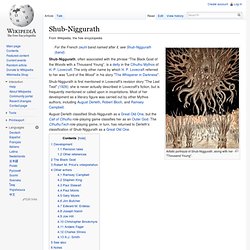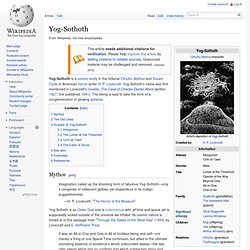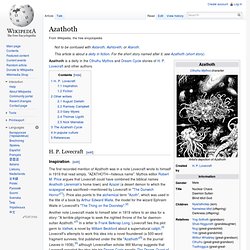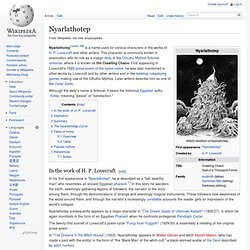

Shub-Niggurath. Artistic portrayal of Shub-Niggurath, along with her "Thousand Young".

Shub-Niggurath, often associated with the phrase “The Black Goat of the Woods with a Thousand Young”, is a deity in the Cthulhu Mythos of H. P. Lovecraft. The only other name by which H. P. Shub-Niggurath is first mentioned in Lovecraft's revision story "The Last Test" (1928); she is never actually described in Lovecraft's fiction, but is frequently mentioned or called upon in incantations. Development[edit] Shub-Niggurath's appearances in Lovecraft's main body of fiction do not provide much detail about his conception of the entity. The next Lovecraft story to mention Shub-Niggurath is scarcely more informative. Ever Their praises, and abundance to the Black Goat of the Woods. Similarly unexplained exclamations occur in "The Dreams in the Witch House" (1932) [3] and "The Thing on the Doorstep" (1933).[4] Revision tales[edit] Other references[edit] The Black Goat[edit] Robert M.
Robert M. Other writers[edit] Edward M. Yog-Sothoth. Yog-Sothoth is a cosmic entity in the fictional Cthulhu Mythos and Dream Cycle of American horror writer H.

P. Lovecraft. Yog-Sothoth's name was first mentioned in Lovecraft's novella, The Case of Charles Dexter Ward (written 1927, first published 1941). The being is said to take the form of a conglomeration of glowing spheres. Mythos[edit] Imagination called up the shocking form of fabulous Yog-Sothoth—only a congeries of iridescent globes, yet stupendous in its malign suggestiveness.
Yog-Sothoth is an Outer God and is coterminous with all time and space yet is supposedly locked outside of the universe we inhabit. It was an All-in-One and One-in-All of limitless being and self—not merely a thing of one Space-Time continuum, but allied to the ultimate animating essence of existence's whole unbounded sweep—the last, utter sweep which has no confines and which outreaches fancy and mathematics alike.
Yog-Sothoth knows all and sees all. The Old Ones[edit] Yog-Sothoth knows the gate. Azathoth. Azathoth is a deity in the Cthulhu Mythos and Dream Cycle stories of H.

P. Lovecraft and other authors. H. P. Lovecraft[edit] Inspiration[edit] The first recorded mention of Azathoth was in a note Lovecraft wrote to himself in 1919 that read simply, "AZATHOTH—hideous name". Price sees another inspiration for Azathoth in Lord Dunsany's Mana-Yood-Sushai, from The Gods of Pegana, a creator deity "who made the gods and thereafter rested.
" Fiction[edit] Aside from the title of the novel fragment, "The Dream-Quest of Unknown Kadath" was the first fiction by Lovecraft to mention Azathoth: [O]utside the ordered universe [is] that amorphous blight of nethermost confusion which blasphemes and bubbles at the center of all infinity—the boundless daemon sultan Azathoth, whose name no lips dare speak aloud, and who gnaws hungrily in inconceivable, unlighted chambers beyond time and space amidst the muffled, maddening beating of vile drums and the thin monotonous whine of accursed flutes.[9] Bibliography.
Nyarlathotep. Although the deity's name is fictional, it bears the historical Egyptian suffix -hotep, meaning "peace" or "satisfaction.

" In the work of H. P. Lovecraft[edit] Nyarlathotep subsequently appears as a major character in "The Dream Quest of Unknown Kadath" (1926/27), in which he again manifests in the form of an Egyptian Pharaoh when he confronts protagonist Randolph Carter. The twenty-first sonnet of Lovecraft's poem-cycle "Fungi from Yuggoth" (1929/30) is essentially a retelling of the original prose poem. In "The Dreams in the Witch House" (1933), Nyarlathotep appears to Walter Gilman and witch Keziah Mason (who has made a pact with the entity) in the form of "the 'Black Man' of the witch-cult," a black-skinned avatar of the Devil described by witch hunters.
Nyarlathotep is also mentioned in "The Rats in the Walls" as a faceless god in the caverns of earth's center. Inspiration[edit] Don't fail to see Nyarlathotep if he comes to Providence. Lovecraft commented: Robert M. Summary[edit] Name.